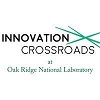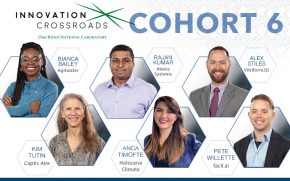
ORNL announces six start-ups that will form Cohort 6 of its “Innovation Crossroads” program
 By Tom Ballard, Chief Alliance Officer, PYA
By Tom Ballard, Chief Alliance Officer, PYA
Six science and technology innovators have been announced as participants in Cohort 6 of Oak Ridge National Laboratory’s (ORNL) “Innovation Crossroads.”
The new group of Fellows who will be here for two years include four sponsored by the U.S. Department of Energy’s (DOE) Advanced Manufacturing Office with DOE’s Building Technologies Office and the Tennessee Valley Authority each sponsoring one innovator in the Lab-Embedded Entrepreneurship Program (LEEP). As the Southeast’s only research and development program for entrepreneurs based at a DOE national laboratory, “Innovation Crossroads” provides unique support to science-based start-ups to help advance game-changing technologies from the laboratory to the marketplace.
This latest group of scientific entrepreneurs is the first to be onboarded in-person and on campus since 2020. They bring those participating in the program to 33 since the inaugural cohort arrived in May 2017.
The latest group of innovators was selected through a competitive merit-based process and will have the opportunity to advance technologies they aim to commercialize by working with world-class science experts and unique capabilities at ORNL. These include Frontier, recently named the world’s fastest supercomputer; the Manufacturing Demonstration Facility, DOE’s largest advanced manufacturing research center; the Building Technologies Research and Integration Center, DOE’s only user facility dedicated to buildings research; and the Spallation Neutron Source for atomic-level insight into materials. The innovators will be partnered with a network of mentoring organizations in the Southeast to help develop business strategies to move their technology breakthroughs into the market.
“Through the Lab-Embedded Entrepreneurship Program, we’re empowering entrepreneurs to pursue domestic clean energy innovation and translate ideas into action,” said Kelly Speakes-Backman, DOE’s Principal Deputy Assistant Secretary for Energy Efficiency and Renewable Energy. “The cutting-edge start-ups and clean energy technologies that result from this program will reduce greenhouse gas emissions, create good-paying jobs for American workers and strengthen American competitiveness.”
Susan Hubbard, ORNL’s Deputy Director for Science and Technology, echoed DOE’s support. “We are excited to bring back our ‘Innovation Crossroads’ cohorts to the ORNL campus over the coming months. These early stage entrepreneurs are developing technologies that will accelerate the decarbonization of the energy, buildings, industry and transportation sectors. They will also support our place-based innovation efforts in the Oak Ridge Corridor and the greater Southeast region.”
 Innovators (pictured here) receive a two-year fellowship that provides a cost-of-living stipend, comprehensive business development plan assistance, and up to $200,000 toward collaborative research and development at ORNL. It is part of what is now the four-lab LEEP program, created by the Advanced Manufacturing Office within DOE’s Office of Energy Efficiency and Renewable Energy to help guide and support science-based startups advance world-class technologies from the lab to the marketplace.
Innovators (pictured here) receive a two-year fellowship that provides a cost-of-living stipend, comprehensive business development plan assistance, and up to $200,000 toward collaborative research and development at ORNL. It is part of what is now the four-lab LEEP program, created by the Advanced Manufacturing Office within DOE’s Office of Energy Efficiency and Renewable Energy to help guide and support science-based startups advance world-class technologies from the lab to the marketplace.
The sixth cohort of Fellows and their respective projects are as follows:
- Bianca Bailey, Founder of Agriwater Corporation. While studying at the University of Illinois, she designed a device called an electro coagulator that turns cow wastewater into more purified water. The uniqueness of the system is the fact that it does not require chemical additives to remove heavy metals and biosolids from livestock wastewater. The benefits of this technology include helping to reduce expensive farmer discharge fines, creating clean water for irrigation or recycling, and preventing pollution. She will be commercializing her dissertation research results during her two-year fellowship.
- Rajan Kumar, Founder of Ateios Systems. He has developed innovative coating and processing technologies necessary to scale solid-state batteries through rapid heterogeneous deposition processes. Ateios uses radiation-curable composite electrodes to increase battery energy density over 350 Wh/kg and reduce the cost to less than $100/kWh. Radiation curable composites will increase manufacturing speed by 10x, or 940 m2/min, reduce processing costs by 26.4 percent and remove toxic organic solvents from the environment.
- Alex Stiles, Co-Founder of Vitriform3D Inc. The company utilizes inorganic waste materials as recycled feedstocks for new value-added polymeric composite products. Glass is one waste stream with properties that do not degrade upon recycling, however, in the U.S. less than one-third of all glass is recycled. This leaves more than eight million tons of glass going to landfills annually. Vitriform3D has developed a patent pending binder jet technology to enable large-scale 3D printing of a wide range of recycled powders, starting with pulverized glass.
- Anca Timofte, Founder of Holocene Climate Corporation. The company is focused on designing and building chemical plants that efficiently remove carbon dioxide from the atmosphere by making use of a novel organic chemistry. Two organic compounds are used cyclically in the process – one compound enhances the capacity of water to take up carbon dioxide, and the other helps remove it from the water through the precipitation of a solid that contains carbon dioxide. When the solid is heated, the carbon dioxide is released in concentrated form and can be stored permanently underground.
- Kim Tutin, Founder of Captis Aire LLC. The start-up developed a new advanced air pollution control technology named the fluidized bed concentrator. The system uses specialized bead activated carbon to adsorb and recover pollutants from the exhaust air rather than oxidize them. Tutin is developing the concentrator for controlling pollutants from wood products produced in manufacturing facilities including those producing liquid biofuels, wood pellets and oriented strand board. In these processes, the primary air pollutant released and recovered is turpentine which is also valuable and can be sold for a variety of uses. Captis Aire is working to catalytically convert turpentine into sustainable aviation fuel.
- Pete Willette, Co-Founder of ai Corporation. The company is developing a fully autonomous, end-to-end building control software platform. This platform deploys a virtual closed loop control strategy, translating building automation into control. By leveraging grid-interactive efficient buildings control technologies, facilities can be turned into smart thermal energy storage systems or batteries. The platform also utilizes proprietary software gateway connectivity and an extreme tagging system for automatic data point discovery and classification.
Applications for Cohort 7 will open this fall.


